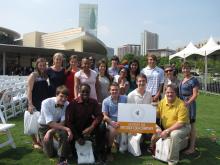Youth role-play situations in which they are involved in philanthropic acts. They analyze the act of philanthropy.
Filter by subjects:
Filter by grades:
Filter by audience:
Filter by issue area:
Filter by content type:
Filter by resource type:
resource search
Together we define philanthropy and identify health and safety issues we encounter in the community. The group creates a visual display showing issues of health and safety that are important to them.
Participants gain exposure to how citizens organize in response to a need. They observe the benefits of group cooperation. They review data they have collected from surveys and work in collaborative groups to identify focus areas for the service-learning project.
The group collaborates to plan, carry out, and reflect on an authentic service project that meets the health and safety needs of the community. This is based on the needs assessment conducted through surveying community members in previous lessons.
Gain knowledge, skills, and approaches to help young people understand issues and resources in their communities so that they can make informed, impactful decisions about how they will contribute their time, talent and treasure.
Urban EdVenture was designed as a yearlong service-learning course for all students in the 5th grade.
These activities help youth see the web of communities to which they belong and define what it means to be a member of a community.
Author: Urban EdVenture Faculty at Westminster
Discussion of the book The Three Questions guides youth to be aware of people and needs around them and the importance of service as a response to the needs of others.
Author: Urban EdVenture Faculty at Westminster
Using different approaches, the group develops a working understanding of the definition of philanthropy.
Author: Urban EdVenture Faculty
Community members share stories of experiences in philanthropy.
Author: Urban EdVenture Faculty
